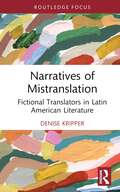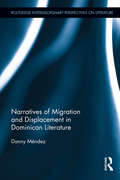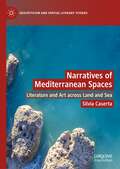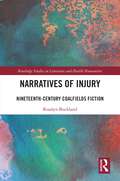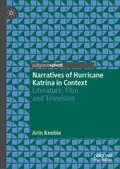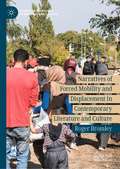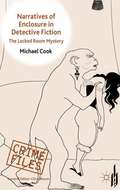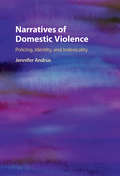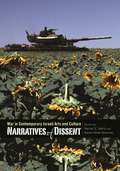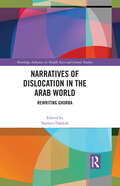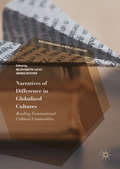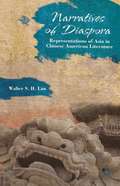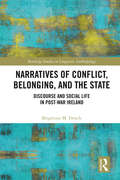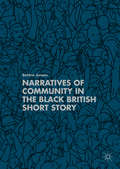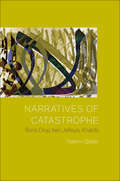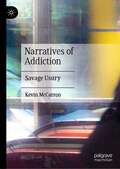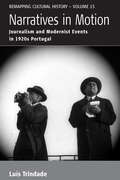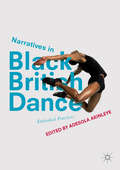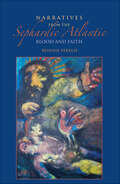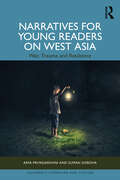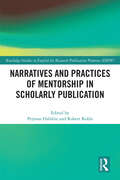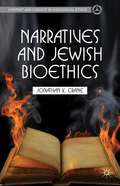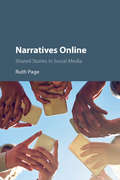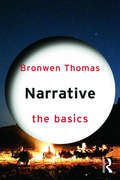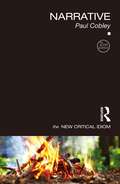- Table View
- List View
Narratives of Mistranslation: Fictional Translators in Latin American Literature (Routledge Studies in Literary Translation)
by Denise KripperThis book offers unique insights into the role of the translator in today’s globalized world, exploring Latin American literature featuring translators and interpreters as protagonists in which prevailing understandings of the act of translation are challenged and upended. The volume looks to the fictional turn as a fruitful source of critical inquiry in translation studies, showcasing the potential for recent Latin American novels and short stories in Spanish to shed light on the complex dynamics and conditions under which translators perform their task. Kripper unpacks how the study of these works reveals translation not as an activity with communication as its end goal but rather as a mediating and mediated process shaped by the unique manipulations and motivations of translators and the historical and cultural contexts in which they work. In exploring the fictional representations of translators, the book also outlines pedagogical approaches and offers discussion questions for the implementation of translators’ narratives in translation, language, and literature courses. Narratives of Mistranslation will be of interest to scholars and educators in translation studies, especially those working in literary translation and translation pedagogy, Latin American literature, world literature, and Latin American studies.
Narratives of Migration and Displacement in Dominican Literature (Routledge Interdisciplinary Perspectives on Literature)
by Danny MéndezEstablishing an interdisciplinary connection between Migration Studies, Post-Colonial Studies and Affect Theory, Méndez analyzes the symbolic interplay between emotions, cognitions, and displacement in the narratives written by and about Dominican and Dominican-Americans in the United States and Puerto Rico. He argues that given the historic place of creolization as a marker of national, cultural, and social development in the Caribbean and particularly the Dominican Republic, this cultural process is not magically annulled in Caribbean immigrations to the U.S. Instead, this book illustrates the numerous ways in which Dominicans’ subjective interpretation of their experiences of migration and incorporation into U.S. society, seen through the filter of multiple creolizations of the past, are woven into their written works as a series of variations on Americanness and Dominicanness. Through close readings of selected writings by Pedro Henríquez Ureña, José Luis González, Junot Díaz, Josefina Báez, Loida Maritza Pérez among others, Méndez argues that emotional creolizations operate as a psychological parameter on immigrant populations as they negotiate their transcultural status against the ideological norms of assimilation in their new host country. Consequently, he proposes that this emotional creolization is dialectical — that is, it not only affects diasporic populations, but also changes the norms and terms of assimilation as well.
Narratives of Mediterranean Spaces: Literature and Art across Land and Sea (Geocriticism and Spatial Literary Studies)
by Silvia CasertaNarratives of Mediterranean Space: Literature and Art across Land and Sea presents a comparative analysis of contemporary literary and visual narratives of movement and migration produced in Italian, Arabic and French. It analyzes how these works create a dialogue across the Mediterranean Sea. By paying attention to the multiple ways in which the Mediterranean is being narrated by contemporary writers and artists, Silvia Caserta aims to propose a reconceptualization of the Mediterranean as a polyphonic space of movement and resistance. The Mediterranean space that emerges from this study is a space that, by virtue of the instability and porosity of its geographical and cultural borders, is able to overcome normative dichotomies between north and south, east and west, local and global. This book proposes the Mediterranean is a fruitful area from which to investigate the wider contradictions of the contemporary global world while avoiding the traps of “Mediterraneanism”. For this reason, the book highlights the contradictions and dissonances that emerge from reading Mediterranean works, opening up multiple perspectives on the Sea and on the different lands that surround it.
Narratives of Injury: Nineteenth-Century Coalfields Fiction (Routledge Studies in Literature and Health Humanities)
by Rosalyn BucklandNarratives of Injury redescribes the history of injury from the perspective of those most at risk, rather than medical professionals and other outsiders. Refocusing on the first-hand perspectives found in literary texts and journalistic accounts, it uncovers a self-conscious tradition of mining stories running through nineteenth-century writing. The book examines both non-canonical authors and famous novelists, including Charles Dickens, Joseph Skipsey, G. A Henty, E. H. Burnett, George Eliot, Edward Tirebuck, H.G. Wells and D. H. Lawrence. Their narratives revise our understanding both of injury and of the radical potential of fiction. Sudden physical injuries have often been configured as fundamentally unknowable by the victims themselves, particularly in studies of nineteenth-century literature and culture. Likewise, narratives of psychological trauma have been largely understood, in Cathy Caruth's words, as the 'attempt to master what was never fully grasped in the first place.' Such readings privilege the reader as a necessary interpreter of physical or psychological injury. By contrast, Narratives of Injury reasserts the significance of patients' own experiences, choices and actions.
Narratives of Hurricane Katrina in Context: Literature, Film and Television
by Arin KeebleThis book analyzes six key narratives of Hurricane Katrina across literature, film and television from the literary fiction of Jesmyn Ward to the cinema of Spike Lee. It argues that these texts engage with the human tragedy and political fallout of the Katrina crisis while simultaneously responding to issues that have characterized the wider, George W. Bush era of American history; notably the aftermath of 9/11 and ensuing War on Terror. In doing so it recognizes important challenges to trauma studies as an interpretive framework, opening up a discussion of the overlaps between traumatic rupture and systemic or, “slow violence.”
Narratives of Forced Mobility and Displacement in Contemporary Literature and Culture (Studies in Mobilities, Literature, and Culture)
by Roger BromleyNarratives of Forced Mobility and Displacement in Contemporary Literature and Culture: Border Violence focuses on the evidence of the effects of displacement as seen in narratives—cinematic, photographic, and literary—produced by, with, or about refugees and migrants. The book explores refugee journeys, asylum-seeking, trafficking, and deportation as well as territorial displacement, the architecture of occupation and settlement, and border separation and violence. The large-scale movement of people from the global South to the global North is explored through the perspectives of the new mobilities paradigm, including the fact that, for many of the displaced, waiting and immobility is a common part of their experience. Through critical analysis drawing on cultural studies and literary studies, Roger Bromley generates an alternative “map” of texts for understanding displacement in terms of affect, subjectivity, and dehumanization with the overall aim of opening up new dialogues in the face of the current stream of anti-refugee rhetoric.
Narratives of Enclosure in Detective Fiction
by Michael CookThe locked room has long fascinated readers of detective fiction with its images of entrapment and entombment. Narratives ofEnclosure is the first full length critical study of the Locked Room Mystery, tracing its origins in Edgar Allan Poe's 'The Murders in the Rue Morgue', the first detective story, up to the modern era. Looking beyond the facade of the impossible crime to examine stories by Charles Dickens, Arthur Conan Doyle, G. K. Chesterton, John Dickson Carr and Paul Auster, Michael Cook uses critical and thematic contexts to show how the idea of enclosure has informed detective fiction at every stage in its history. Whether in the narrative itself, as in John Dickson Carr's classic Golden Age novel The Hollow Man, or the psychological relationship with physical environments in Dickens's 'The Signalman', the metaphor of the locked room casts a long shadow on the wider genre. "
Narratives of Domestic Violence: Policing, Identity, and Indexicality
by Jennifer AndrusDomestic violence is an intractable social problem that must be understood in order to be eradicated. Using theories of indexicality, identity, and narrative, Andrus presents data from interviews she conducted with victims and law enforcement, and analyses the narratives of their interactions and the identities that emerge. She gives insight into law enforcement views on violence, and prevalent misconceptions, in order to create resources to improve communication with victim/survivors. She also analyzes the ways in which identity emerges and is performed via narrative constructions of domestic violence and encounters between police and victim/survivors. By giving voice to the victims of domestic violence, this book provides powerful insights into the ways that ideology and commonplace misconceptions impact the social construction of domestic violence. It will be invaluable to students and researchers in discourse analysis, applied linguistics and forensic linguistics.
Narratives of Dissent: War in Contemporary Israeli Arts and Culture
by Rachel S. Harris Ranen Omer-ShermanThe year 1978 marked Israel's entry into Lebanon, which led to the long-term military occupation of non-sovereign territory and the long, costly war in Lebanon. In the years that followed, many Israelis found themselves alienated from the idea that their country used force only when there was no alternative, and Israeli society eventually underwent a dramatic change in attitude toward militarization and the infallibility of the IDF (Israel Defense Forces). In Narratives of Dissent: War in Contemporary Israeli Arts and Culture editors Rachel S. Harris and Ranen Omer-Sherman collect nineteen essays that examine the impact of this cultural shift on Israeli visual art, music, literature, poetry, film, theatre, public broadcasting, and commemoration practices after 1978. Divided into three thematic sections-Private and Public Spaces of Commemoration and Mourning, Poetry and Prose, and Cinema and Stage-this collection presents an exciting diversity of experiences, cultural interests, and disciplinary perspectives. From the earliest wartime writings of S. Yizhar to the global phenomenon of films such as Beaufort, Waltz with Bashir, and Lebanon, the Israeli artist's imaginative and critical engagement with war and occupation has been informed by the catalysts of mourning, pain, and loss, often accompanied by a biting sense of irony. This book highlights many of the aesthetic narratives that have wielded the most profound impact on Israeli culture in the present day. These works address both incremental and radical changes in individual and collective consciousness that have spread through Israeli culture in response to the persistent affliction of war. No other such volume exists in Hebrew or English. Students and teachers of Israeli studies will appreciate Narratives of Dissent.
Narratives of Dislocation in the Arab World: Rewriting Ghurba (Routledge Advances in Middle East and Islamic Studies)
by Nadeen DakkakThis monograph explores and investigates narratives of physical, psychological, and emotional dislocation that take place within the Arab world, approaching them as manifestations of the Arabic word ghurba, or estrangement, as a feeling and state of being. Distancing itself from the centrality of the "West" in postcolonial and Arabic literary studies, the book explores experiences of migration, displacement and cosmopolitanism that do not directly ensue from the encounter with Europe or the European other. Covering texts from the Levant, Egypt, the Arabian Peninsula and beyond from the 19th, 20th and 21st centuries, the book grounds narratives of dislocation in the political, social and cultural structures that affect the everyday lived experiences of individuals and communities. An analysis of Arabic, Turkish and English texts – encompassing fiction, memoirs and translations – highlights less visible narratives of ghurba, specifically amongst ethnic minorities and religious communities. Ultimately, the chapters contribute to a picture of the Arab world as a place of ghurba where mobile and immobile subjects, foreigners and local inhabitants alike, encounter alienation. Bringing together a diverse range of academic perspectives, the book will be of interest to students and scholars in postcolonial and comparative literary studies, history, and Arabic and Middle East studies.
Narratives of Difference in Globalized Cultures
by Belén Martín-Lucas Andrea RuthvenThis book is about how the marketing of transnational cultural commodities capitalizes on difference and its appeal for cosmopolitan consumers in our postmodern globalized world. At what price? What ethical and political conundrums does the artist/writer/reader confront when going global? This volume analyzes why difference - whether gender, sexual, racial, ethnic, or linguistic - has become such a prominent element in the contemporary cultural field, and the effects of this prevalence on the production, circulation and reception of cultural commodities in the context of globalization. At the intersection of globalization, diaspora, postcolonial and feminist studies in world literature, these essays engage critically with a wide variety of representative narratives taken from diverse cultural fields, including humanitarian fiction, multilingual poetry, painting, text-image art, performance art, film, documentary, and docu-poetry. The chapters included offer counter-readings that disrupt hegemonic representations of cultural identity within the contemporary, neoliberal and globalized landscape.
Narratives of Diaspora
by Walter S. H. LimChinese American authors often find it necessary to represent Asian history in their literary works. Tracing the development of the literary production of Maxine Hong Kingston, Amy Tan, Lisa See, and Russell Leong, among others, this book captures the effects of international politics and globalization on Chinese American diasporic consciousness.
Narratives of Conflict, Belonging, and the State: Discourse and Social Life in Post-War Ireland (Routledge Studies in Linguistic Anthropology)
by Brigittine M. FrenchUsing key perspectives from Linguistic anthropology the book illuminates how social actors take up the ideals of law, equality, and democratic representation in locally-meaningful ways to make their own national history in ways that may perpetuate violence and inequality. Focusing specifically on post-war conditions in Ireland, the author contextualizes commonplace practices by which citizens are made to learn the gap between official membership in and political belonging to a democratic state. Each chapter takes up a different aspect of state authority and power to constitute citizenship, to enact laws, to mediate conflict, and to create histories in the context of social inequalities and political hostilities. This book is an excellent ethnographic addition to courses in linguistic anthropology, giving readers the opportunity to explore applications and ramifications of key theoretical text within research.
Narratives of Community in the Black British Short Story
by Bettina JansenNarratives of Community in the Black British Short Story offers the first systematic study of black British short story writing, tracing its development from the 1950s to the present with a particular focus on contemporary short stories by Hanif Kureishi, Jackie Kay, Suhayl Saadi, Zadie Smith, and Hari Kunzru. By combining a postcolonial framework of analysis with Jean-Luc Nancy’s deconstructive philosophy of community, the book charts key tendencies in black British short fiction and explores how black British writers use the short story form to combat deeply entrenched notions of community and experiment with non-essentialist alternatives across differences of ethnicity, culture, religion, and nationality.
Narratives of Catastrophe: Boris Diop, ben Jelloun, Khatibi
by Nasrin QaderNarratives of Catastrophe tells the story of the relationship between catastrophe, in the senses of "down turn" and "break," and narration as "recounting" in the senses suggested by the French term récit in selected texts by three leading writers from Africa. Qader's book begins by exploring the political implications of narrating catastrophic historical events. Through careful readings of singular literary texts on the genocide in Rwanda and on Tazmamart, a secret prison in Morocco under the reign of Hassan II, Qader shows how historical catastrophes enter language and how this language is marked by the catastrophe it recounts. Not satisfied with the extra-literary characterizations of catastrophe in terms of numbers, laws, and naming, she investigates the catastrophic in catastrophe, arguing that catastrophe is always an effect of language andthought,. The récit becomes a privileged site because the difficulties of thinking and speaking about catastrophe unfold through the very movements of storytelling.This book intervenes in important ways in the current scholarship in the field of African literatures. It shows the contributions of African literatures in elucidating theoretical problems for literary studies in general, such as storytelling's relationship to temporality, subjectivity, and thought. Moreover, it addresses the issue of storytelling, which is of central concern in the context of African literatures but still remains limited mostly to the distinction between the oral and the written. The notion of récit breaks with this duality by foregrounding the inaugural temporality of telling and of writing as repetition.The final chapters examine catastrophic turns within the philosophical traditions of the West and in Islamic thought, highlighting their interconnections and differences.
Narratives of Addiction: Savage Usury
by Kevin McCarronNarratives of Addiction: Savage Usury is the first book to argue, in the face of more than a century’s received wisdom, that drug addiction and alcoholism are undoubtedly evidence of individual moral flaws. However, the sense of morality that underlies this book is completely severed from Christianity. Instead, it is influenced in particular by the writings of the nineteenth-century German philosophers Arthur Schopenhauer and Frederick Nietzsche, both of whom insisted that a genuine morality was actually incompatible with Christianity. The sequence of chapters moves from addictions on the streets, into rehab clinics, and finally into the meetings of Alcoholics Anonymous and Narcotics Anonymous. This is the first book to argue that the search for pleasure drives alcoholism and drug addiction and not the “numbing of pain”. Throughout the book I reject the claims of the medical profession, as embodied by the American Medical Association, that drug addiction and alcoholism are diseases, and further argue that they do not have the authority to tell hundreds of millions of Americans that addiction is not a moral failing. I also query throughout the book the claims of neuroscience, psychology, and the social sciences that addictions to alcohol and drugs are attributable to causes that their specific disciplines are best suited to understand. I argue that there is nothing complex about addiction: it is a simple behavioural disorder. The language routinely employed to discuss addiction is similarly not complex, just confused, and so it is also the rhetoric of addiction discourse, especially its use of simile, metaphor and euphemism, that this book evaluates.
Narratives in Motion: Journalism and Modernist Events in 1920s Portugal (Remapping Cultural History #15)
by TrindadeInterwar Portugal was in many ways a microcosm of Europe's encounter with modernity: reshaped by industrialization, urban growth, and the antagonism between liberalism and authoritarianism, it also witnessed new forms of media and mass culture that transformed daily life. This fascinating study of newspapers in 1920s Portugal explores how the new "modernist reportage" embodied the spirit of the era while mediating some of its most spectacular episodes, from political upheavals to lurid crimes of passion. In the process, Luís Trindade illuminates the twofold nature of that journalism-both historical account and material object, it epitomized a distinctly modern entanglement of narrative and event.
Narratives in Black British Dance
by Adesola AkinleyeThis book explores Black British dance from a number of previously-untold perspectives. Bringing together the voices of dance-artists, scholars, teachers and choreographers, it looks at a range of performing arts from dancehall to ballet, providing valuable insights into dance theory, performance, pedagogy, identity and culture. It challenges the presumption that Blackness, Britishness or dance are monolithic entities, instead arguing that all three are living networks created by rich histories, diverse faces and infinite future possibilities. Through a variety of critical and creative essays, this book suggests a widening of our conceptions of what British dance looks like, where it appears, and who is involved in its creation.
Narratives from the Sephardic Atlantic: Blood and Faith (Sephardi and Mizrahi Studies)
by Ronnie PerelisIdentity, family, and community unite three autobiographical texts by New World crypto-Jews, or descendants of Jews who were forced to convert to Christianity in 17th-century Iberia and Spanish America. Ronnie Perelis presents the fascinating stories of three men who were caught within the matrix of inquisitorial persecution, expanding global trade, and the network of crypto-Jewish activity. Each text, reflects the unique experiences of the author and illuminates their shared, deeply rooted attachment to Iberian culture, their Atlantic peregrinations, and their hunger for spiritual enlightenment. Through these writings, Perelis focuses on the social history of transatlantic travel, the economies of trade that linked Europe to the Americas, and the physical and spiritual journeys that injected broader religious and cultural concerns into this complex historical moment.
Narratives for Young Readers on West Asia: War, Trauma and Resilience (Children's Literature and Culture)
by Arya Priyadarshini Suman SigrohaThrough critical textual analysis of the trauma narratives for young readers written in English on political conflicts and the violation of humanitarian values, this book recovers the response to trauma from the margins of the survivor spectrum. By focusing on the experiences of Syrian and Palestinian children, it elucidates how their stories are often portrayed in a manner that not only emphasises their resilience but also underscores the gravity of the experiences. The book sheds light on the multifaceted impact of the conflicts on the region and the psychological toll they take on the younger generation through the representation of their experiences in these narratives. The harrowing experiences of refugees, war victims and displaced persons from non- Western countries often lack a voice in the advancement of the trauma discourse. The theoretical approach utilised in this research thus employs child and adolescent psychoanalysis to extend the existing approach to trauma studies, and brings the neglected and under- represented trauma narratives to the fore. Many of the atrocities discussed in this book continue in the present times, which makes the study of this subject matter even more vital. The ongoing war between Israel and Hamas that has killed thousands of people in the region within a short space of time makes this research even more pertinent and urgent, as the widespread violence and suffering has echoed the trauma that the region has undergone in the past decades.
Narratives and Practices of Mentorship in Scholarly Publication (Routledge Studies in English for Research Publication Purposes)
by Pejman Habibie Robert KohlsThis edited volume explores mentorship in knowledge production and dissemination and examines its implications for academic lives and careers of novice scholarly writers.By bringing together experts in a variety of areas in applied linguistics, the book addresses the complex topic of mentorship in scholarly publication practices of junior scholars. Drawing on the perspectives and experiences of novice scholars, supervisors, practitioners, and researchers, it intends to demystify the socialization process of junior academics and help paint a richer and more nuanced picture of the practices, experiences, and challenges of mentorship in writing for publication. An important aspect of the book is a serious attempt to explore the experiences of different stakeholders both through empirical research and personal (hi)stories and accounts.The book acts as a valuable resource for graduate students and both novice and established scholars looking to build a more holistic understanding of mentorship in scholarly publication today, in such fields as English for research publication purposes, applied linguistics, and TESOL.
Narratives and Jewish Bioethics
by Jonathan K. CraneNarratives and Jewish Bioethics searches for answers to the critical question of what roles ancient narratives play in creating modern norms by Jewish bioethicists utilizing the Jewish textual tradition.
Narratives Online: Shared Stories in Social Media
by Ruth PageStories are shared by millions of people online every day. They post and re-post interactions as they re-tell and respond to large-scale mediated events. These stories are important as they can bring people together, or polarise them in opposing groups. Narratives Online explores this new genre - the shared story - and uses carefully chosen case-studies to illustrate the complex processes of sharing as they are shaped by four international social media contexts: Wikipedia, Facebook, Twitter and YouTube. Building on discourse analytic research, Ruth Page develops a new framework - 'Mediated Narrative Analysis' - to address the large scale, multimodal nature of online narratives, helping researchers interpret the micro- and macro-level politics that are played out in computer-mediated communication.
Narrative: Stories And Storytelling In The Digital Age (The Basics)
by Bronwen ThomasProviding an up-to-date and accessible overview of the essentials of narrative theory, Narrative: The Basics guides the reader through the major approaches to the study of narrative, using contemporary examples from a wide range of narrative forms to answer key questions including: What is narrative? What are the "universals" of narrative? What is the relationship between narrative and ideology? Does the reader have a role in narrative? Has the digital age brought radically new forms of narrative? Each chapter introduces key theoretical terms, providing thinking points and suggestions for further study. With an emphasis on applying theory to example studies, it is an ideal introduction to the current study of narrative.
Narrative: A Critical Linguistic Introduction (The New Critical Idiom)
by Paul CobleyHuman beings have constantly told stories, presented events and placed the world into narrative form. This activity suggests a very basic way of looking at the world, yet, this book argues, even the most seemingly simple of stories is embedded in a complex network of relations. Paul Cobley traces these relations, considering the ways in which humans have employed narrative over the centuries to ‘re-present’ time, space and identity. This second, revised and fully updated edition of the successful guidebook to narrative covers a range of narrative forms and their historical development from early oral and literate forms through to contemporary digital media, encompassing Hellenic and Hebraic foundations, the rise of the novel, realist representations, narratives of imperialism, modernism, cinema, postmodernism and new technologies. A final chapter reviews the way that narrative theory in the last decade has re-orientated definitions of narrative. Written in a clear, engaging style and featuring an extensive glossary of terms, this is the essential introduction to the history and theory of narrative.
